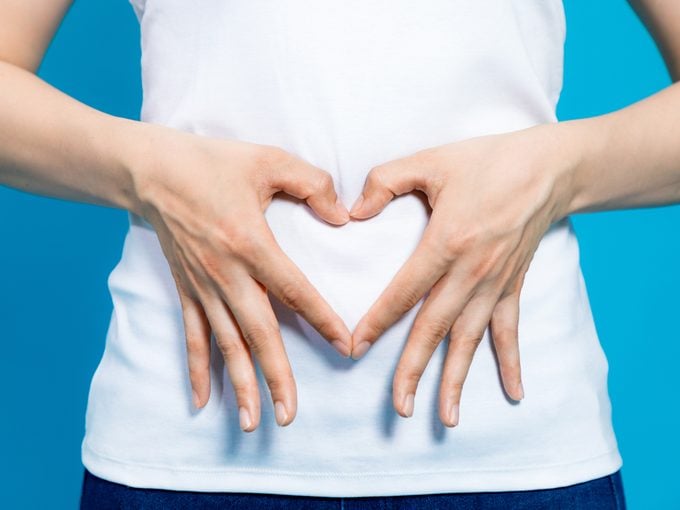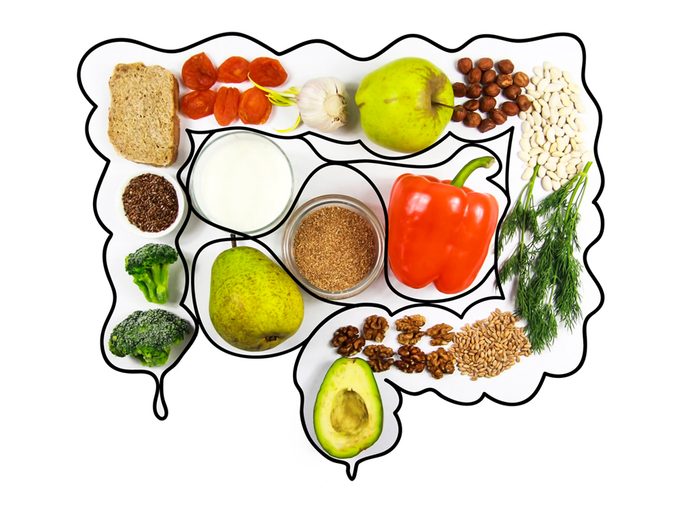Ready to Get Your Gut Health in Check?
Canada's Gut Health Expert, Andrea Hardy, shares tips on improving your gut health so you can feel better both mentally and physically.

You know the idiom, “listen to your gut”? Turns out, taking it literally can give you some beneficial insight into your own health. That’s because your gut plays a huge role in keeping you healthy.
Your gut is filled with tiny living things like bacteria, viruses, and fungi. These are known as microorganisms (microbes, for short), which make up the gut microbiome. Some of these microbes are responsible for keeping you healthy—specifically, to break down food and turn it into the nutrients your body craves—while others can have the opposite effect. We all have a mix of good and bad microbes in our gut, but our (like poor sleep, high alcohol consumption and inactivity) can disrupt the amounts of each and cause health woes. To help Canadians understand why nourishing your gut is so important, Andrea Hardy, registered dietitian and gut health specialist, shares key takeaways from her recent workshop at Activia’s We’ve Got Guts Forum.

Add Probiotics to your Diet
When it comes to building a healthy diet, Hardy suggests focusing on good prebiotics. Specifically, Hardy says you should reach for gut-friendly foods such as fruits with their skins on (like apples and pears), vegetables (particularly artichokes, broccoli, green peas, squash and potatoes with their skin on), whole grains (try brown rice, quinoa and barley), nuts and seeds (your favourites will do), and pulses (think beans, peas and lentils). Incorporate them into each meal, add in a prebiotic and you’ll be feeding your gut all the right stuff. While probiotics are often comsumed as a supplement, you can integrate good microbes into your diet too. Fermented tempeh, kimchi and yogurt like Activia the pioneer of probiotic yogurt in the Danone family of brands, can help you take care of your digestive well-being every day.

Chew x 30
“Digestion starts in the mouth,” says Hardy. Chewing your food produces digestive enzymes that help break down food from larger chunks to smaller ones. This makes it easier for your body to digest the food and easier for it to absorb the essential nutrients. Chew slowly, enjoy your food, and count to 30 for every bite. Your gut will be happy.
Rest Your Gut
“Work on getting 7+ hours of sleep a night, with regular falling-asleep and waking-up times, even on weekends,” says Hardy. That’s because new research found that an inconsistent sleep schedule—even just a 90-minute change to your usual routine—could negatively impact your gut health.

Cut Back on Alcohol
Hardy suggests reducing alcohol intake as recent studies have noted alcohol causes inflammation in the gut and excessive consumption can exacerbate alcohol-related disorders like cancers, liver disease, and neurological diseases. What’s more, alcohol-induced gut inflammation can also lead to a leaky gut, bacterial overgrowth, and more. Does that mean you have to cut out alcohol entirely? Not if you don’t want to. Moderate alcohol consumption (about one drink a day for women) is unlikely to disrupt your gut microbiome.
Get Moving
Oh, the power of exercise! We all know it does our mind and body good, but did you know it also positively impacts our innards, too? Studies suggest that moving your body can boost the number of good microbes in the gut. A warning: If you’re someone with digestive woes, Hardy suggests staying away from high-intensity exercise, because even though it can be a great workout, it can worsen symptoms. Instead, “focus on gentle movement for 30-60 minutes a day like walking or yoga,” she says.

The importance of gut health is the foundation of our well-being, influencing not only our digestive system but our immune system, mental health and risks for diseases. Hardy encourages Canadians to embrace the saying, “you are what you eat” and implement these simple tips to invest in a healthier and happier future.





